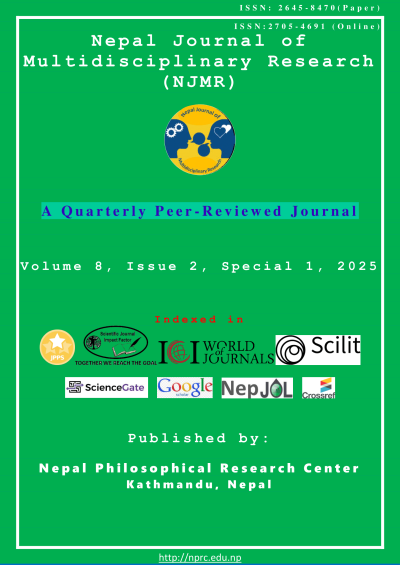Beyond Discipline: Quantifying the Impact of Prior AI Experience and Digital Literacy on Student Acceptance of Educational AI
DOI:
https://doi.org/10.3126/njmr.v8i2.78027Keywords:
AI in education, student perception, quantitative analysis, field of study, technology acceptance, demographic factorsAbstract
Background: The integration of artificial intelligence (AI) in education has transformed learning through tools like chatbots, automated grading, and personalized tutoring. However, student acceptance varies based on demographic and academic factors, necessitating a deeper understanding of AI perception in learning environments.
Objective: This study investigates how gender, age, and field of study influence students’ perceptions of AI in education, aiming to identify key factors that shape trust and adoption.
Methods: A quantitative cross-sectional survey was conducted with 200 university students using a 5-item Likert scale (α = 0.809). Data were analyzed via regression and ANOVA to assess the impact of gender, age, and academic discipline on AI perception.
Findings: Field of study was the only significant predictor of AI perception (*p* = 0.038), with technical disciplines showing more favorable attitudes. Gender and age had no statistically significant effect. The model’s low explanatory power (R² = 0.035) suggests other unmeasured factors influence AI perception.
Conclusion: Academic discipline plays a critical role in shaping students' attitudes toward AI, while demographic factors like gender and age show minimal impact. Future research should explore additional variables such as prior AI exposure and cultural influences.
Novelty: This study contributes to the Technology Acceptance Model (TAM) by highlighting discipline-specific differences in AI perception, offering insights for tailored AI integration strategies in education.
Downloads
Downloads
Published
How to Cite
Issue
Section
License
Copyright (c) 2025 The Author(s)

This work is licensed under a Creative Commons Attribution-NonCommercial 4.0 International License.
This license enables reusers to distribute, remix, adapt, and build upon the material in any medium or format for noncommercial purposes only, and only so long as attribution is given to the creator.




